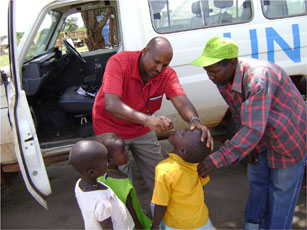STOP: Requirements and Responsibilities
Duties and Responsibilities
Stop Transmission of Polio (STOP) participants do not choose the countries to which they are assigned, but may indicate a preference. Placement in a preferred country is not guaranteed. Although participants are recruited and trained primarily by the U.S. Centers for Disease Control and Prevention (CDC), once on assignment STOP participants are under the supervision of either WHO or UNICEF. As such, STOP participants serve as short-term WHO or UNICEF consultants working at the district level.

There are three types of positions:
Living and Working Conditions
STOP assignments are intended for public health professionals with years of experience who are able to work with little support and supervision. Living and working conditions can be very difficult in countries to which STOP participants are assigned. Challenges may include lack of adequate electricity and water, rugged traveling conditions, limited medical facilities, and limited communication systems.
STOP participants must be in excellent physical condition. STOP encourages participants who will need close medical supervision and access to medical facilities to postpone applying for a STOP assignment until the need for close medical supervision has been eliminated.
Finances
The STOP program is financially possible because it is made up of volunteers. Participants are not paid a salary. Through the support of WHO, Rotary International, UNICEF, Canadian Public Health Association (CPHA), and CDC, participants are provided with airline tickets and a per diem to cover lodging, food, and authorized miscellaneous expenses.
Orientation
Prior to departing for the assignment, participants receive approximately two weeks of orientation conducted by CDC, WHO, UNICEF, and CPHA staff in Atlanta, Georgia, United States. The purpose of the orientation is to provide participants with an overview of the assignment. Topics covered include a global overview of polio eradication strategies, as well as an overview of routine immunization and disease surveillance activities. In addition, upon arrival in the country of assignment, STOP participants are given a country-specific orientation by the in-country team.
Technical Qualifications
STOP teams require highly qualified public health professionals. The minimum qualification to be considered for a STOP assignment is at least five years of relevant public health experience.
- Field position technical qualifications
- Data Management position technical qualifications
- Communications position technical qualifications
Prior international work and fluency in French, Portuguese, or Arabic are considered additional strengths, but are not required.
Note: Supervisory approval will be required for all STOP participants who are currently employed. CDC applicants must have supervisory approval before applying to the program.
Social Qualifications
It is critical that each candidate be able to work exceptionally well with others and possess strong interpersonal skills. WHO or UNICEF field staff and Ministry of Health counterparts, as well as CDC and CPHA staff, reserve the right to end an assignment at any time ( during orientation, and while on assignment) should they feel the STOP participant is having difficulty communicating with others, is being culturally insensitive, is allowing personal issues to interfere with their job, is not fulfilling his or her duties to the satisfaction of any of the partners, or is jeopardizing the program in any way.
STOP Team Assignments are Unaccompanied Positions
STOP participants are frequently sent to challenging environments with very demanding living conditions. Family members are not permitted to accompany STOP participants during the training in Atlanta or the country field assignment. Applicants also should be aware that communications with family members can be very limited, as many areas may have little or no telephone or Internet access. Applicants should seriously consider their personal situation before applying.
Get email updates
To receive email updates about the Global Health site, enter your email address:



